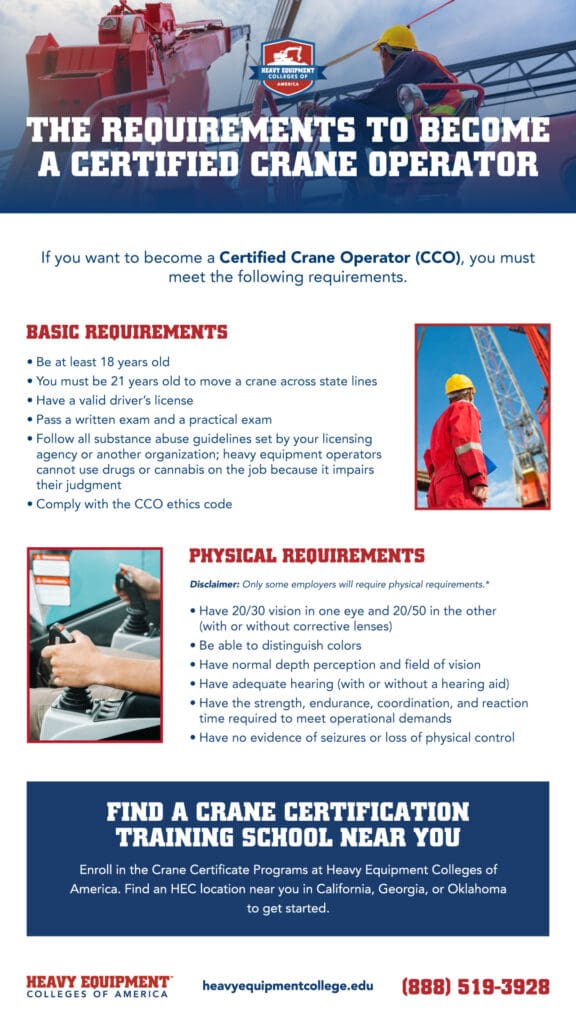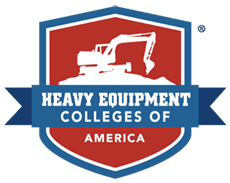Table of Contents
If you’re not sure how to get your crane operator license, Heavy Equipment Colleges of America (HEC) is here to help. As the leading crane operator school in California, Georgia, and Oklahoma, HEC knows what it takes to qualify for an accredited training program and obtain your license. Keep reading to learn more.
About Crane Certification
OSHA (Occupational Safety and Health Administration) requires crane operators to obtain a license for the specific type of crane(s) they will operate on the job. This requirement ensures the operator knows how to operate the crane and troubleshoot any problems they might encounter in the field. Depending on where you live, your state, county, or municipality might also require you to obtain a local crane operating license or certification.
Organizations like the NCCCO (National Commission for the Certification of Crane Operators) provide certification training, and state governments issue licenses to those who have completed a crane operator training program. Crane certifications must be renewed every five years to remain valid. You must get recertified in the last 12 months of your valid license. If you wait to get recertified until after your valid license expires, you risk having to start the certification process over again.
Prevent Accidents with Professional Training
Enroll in HEC’s Crane Operation Programs
Hands-On Training | Real Equipment Experience | Expert Instructors
Build a Safer, More Successful Career!
Start Enrollment ProcessFind The Right Location For YouHow Long Does It Take To Become a Crane Operator?
Different crane training programs take different lengths of time to complete. At HEC, our crane programs can be completed in as little as three weeks. That way, you don’t have to put your life on hold to pursue your career goal of becoming a crane operator.
If you complete apprenticeship training, it will take an additional three to four months to earn your license. After that, all you have to do is pass the written and practical exam, and you’ll be a certified crane operator.

What Do Crane Operators Do?
Crane operators control cranes, which are specialized machines that lift and move heavy loads in various industries, particularly the construction industry. An operator’s primary duties include reading blueprints, setting up the crane at the worksite, ensuring proper load attachments, and executing precise maneuvers to lift and position materials. Crane operators must adhere to safety protocols, communicate effectively with team members, and have a thorough understanding of the equipment they operate to prevent accidents and ensure efficiency on job sites.
How Much Do Crane Operators Make?
In May 2022, crane operators made a mean hourly wage of $31,36 and a mean annual wage of $65,220—according to the Bureau of Labor Statistics (BLS). Some key factors that affect your salary include:
- What state you work in
- What industry you work in
- Your skill and experience levels
- What licenses and certifications you have
What Are the Requirements to Become a Certified Crane Operator?
If you want to become a certified crane operator (CCO), you must meet the following requirements.
Basic Requirements
- Be at least 18 years old.
- You must be 21 years old to move a crane across state lines.
- Have a valid driver’s license
- Pass a written exam and a practical exam
- Finish entry-level driver training for obtaining a
- Follow all substance abuse guidelines set by your licensing agency or another organization; heavy equipment operators cannot use drugs or cannabis on the job because it impairs their judgment
- Comply with the CCO ethics code
Physical Requirements
Disclaimer: Only some employers will require physical requirements.*
- Have 20/30 vision in one eye and 20/50 in the other (with or without corrective lenses)
- Be able to distinguish colors
- Have normal depth perception and field of vision
- Have adequate hearing (with or without a hearing aid)
- Have the strength, endurance, coordination, and reaction time required to meet operational demands
- Have no evidence of seizures or loss of physical control
Crane Operator License & Certification Requirements
These are the steps required to earn your crane operator license.
1. Find an NCCCO-accredited crane training program
You can’t successfully operate a crane until you know how to operate one, which can only be learned in a training program. The program you enroll in should be accredited by the NCCCO and offer both personalized classroom instruction and practical hands-on training. Most employers won’t hire a candidate who has not completed relevant training.
2. Pass the written exam
The written exam consists of one core examination and up to three specialty examinations, which go more in-depth into operation techniques for specific crane types. Candidates have 90 minutes to complete 90 multiple-choice questions on the core exam and 60 minutes to complete 26 multiple-choice questions on any of the specialty exams. All candidates must pass the core examination and at least one specialty examination to become certified for five years.
3. Pass the practical exam
The practical exam tests a candidate’s proficiency in five essential tasks:
- Pre-Operational (Shift) Inspection
- Chain in Circle
- Test Weight in Pole Circle
- Zigzag Corridor (forward and reverse)
- Safe Shutdown and Securing Procedures
Candidates can choose to take the practical exam geared toward lattice boom cranes, telescopic boom cranes with a swing cab, or telescopic boom cranes with a fixed cab.
Industry Demand for Crane Operators
According to the BLS, jobs for construction equipment operators—which include crane operators—are projected to grow by 3% between 2022 and 2032, with 42,300 new jobs opening each year over the decade.
Find a Crane Certification Training School Near You
Our crane training programs equip students like you with the skills and hands-on experience required to secure a job in the field. From crane safety tips to efficient loading techniques, we cover everything you need to know to succeed in your career as a crane operator. Don’t wait to earn your license. Apply to our accredited crane operator college today to get one step closer to achieving your goal. We’ll help you find the program that’s right for your future.
Learn to Operate Safely & Efficiently
Get Certified Through HEC’s Crane Training
Safety-Focused Curriculum | Fast-Track Programs | Job Support Services
Secure Your Future in Heavy Equipment Today!
Start Enrollment ProcessFind The Right Location For You
